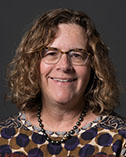
Mary Lou Guerinot
Dartmouth College
|
Primary Section: 62, Plant, Soil, and Microbial Sciences Secondary Section: 25, Plant Biology Membership Type:
Member
(elected 2016)
|
Biosketch
Mary Lou Guerinot is a molecular geneticist recognized for her work on iron homeostasis in plants. Guerinot was born and raised in Rochester, NY. She earned her bachelor’s degree at Cornell University and her PhD from Dalhousie University, followed by postdoctoral studies at the University of Maryland and at the DOE–MSU Plant Research Laboratory. At Dartmouth, she rose through the ranks to full professor, and is the Ronald and Deborah Harris Professor in the Sciences. She is a Past President of the American Society of Plant Biologists (ASPB) and is a fellow of the American Association for the Advancement of Science (AAAS) and ASPB. She is a recipient of the Dartmouth Graduate Mentoring Award, the Dean of Faculty Award for Outstanding Mentoring and Advising and the Dennis R. Hoagland Award from ASPB. She is a member of the National Academy of Sciences.
Research Interests
More than 2 billion people are iron-deficient because their plant-based diets are not a rich source of iron. Our research has identified key players involved in the mobilization of iron from the soil to the seed, including the FRO2 ferric chelate reductase that catalyzes the rate limiting step at the root-soil interface; a divalent cation transporter, IRT1, essential for iron uptake from the soil; FRD3, an effluxer necessary for movement of iron from the root to the shoot and VIT1 that transports iron into the vacuole from where it can be mobilized by germinating seeds. We have helped to define the field of ionomics, an innovative combination of high throughput elemental analysis using inductively coupled plasma mass spectroscopy (ICP-MS), with bioinformatics, molecular genetics and ecology, providing a new conceptual framework for plant mineral nutrition. To overcome some of the historic limitations in studying metal distribution in plants, we have pioneered the use of X-ray fluorescence spectroscopy to simultaneously map the distribution of multiple elements at the cellular and sub-cellular levels. We have learned that mis-localization of iron in the seed has profound consequences for seedling viability. Our work uncovered a fundamental aspect of seed biology that will ultimately aid the development of nutrient-rich seed, benefiting both human health and agricultural productivity.

